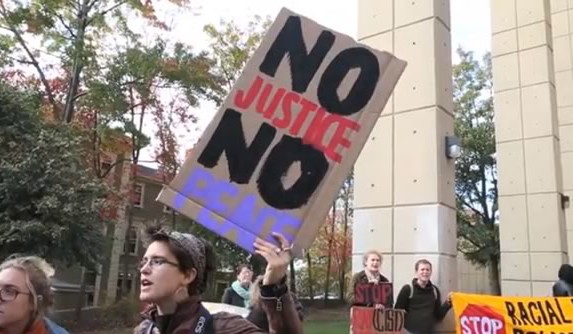Most everyone seems to agree that Tuesday was not our university’s finest hour. I’ve heard many of my friends express some sort of embarrassment for being affiliated with Brown after the Ray Kelly event was shut down because of unruly protestors. But my shame stems not from the fact that a bunch of Ivy League liberals shouted down an authority figure with whom they disagreed, but from the fact that the university invited Kelly to speak at all.
Allow me first to say that I am not speaking on behalf of any of the protestors. I was unable to attend the Kelly event and know of what happened only from others’ stories. Further, I admit that I am skeptical about whether shutting down the event by shouting down the speakers was the most effective means of making the point. That said, it is important to distinguish between objecting to the university’s legitimizing racism and infringing upon the sacred freedoms of speech and thought — and judging by the reactions I’ve seen and heard from my peers, most of those who were offended by the protest are failing to understand the difference.
It is easy to cast the protestors as stubborn illiberal liberals who seek to stifle the opinions of those with whom they disagree. Perhaps for a minority of them that is true. But Kelly, best known for his association with the New York City Police Department’s “stop-and-frisk” racial profiling practices, does not just represent a competing ideology. It’s not just that his views and policies are wrong, it’s that they are based on fundamental racial prejudices that have no place in intellectual discourse.
It is an honor to be invited to speak at an Ivy League university. Just by association, the scholars and luminaries who are chosen to be our guests of honor are lent a unique ethos. For an outsider, to be honored with prestige in academia is a privilege that (in theory) only the most intellectual, inspirational, and truly exceptional enjoy. When Brown University invites someone to speak on campus, we are endorsing him or her as someone whose views are worthy of intellectual discussion and debate at the highest level. By doing so for Ray Kelly, Brown University offered this legitimacy to a man who is best known for judging people by the color of their skin.You have a right to be racist in this country. If you think certain groups of people are better or more righteous than others, that’s your prerogative. But let’s call it what it is. And bigotry has no place in the most inclusive, open, and accepting community of people I have ever been a part of. “Racism is not up for debate,” one protestor shouted. But according to Brown University, it is.
Ron Paul wasn’t treated this way when he came to campus a few months ago. If Ted Cruz or Paul Ryan came to Brown there might be controversy, but surely each would be allowed to have his say. Why? Because, for whatever objections our students might have to their ideas, there is room for debate. They are thoughtful people who (when they’re not speaking in sound-bites) have interesting and substantive things to contribute to discussions of the biggest issues we face today. Say what you want about their approaches to policy, but their views are not fundamentally based on a distrust of people who are different from themselves.
Would it be appropriate for Brown to pay and give an official platform to Fred Phelps, the head of the Westboro Baptist Church? What about Thomas Robb, National Director of the Ku Klux Klan? Or Jeff Schoep, Commander of the National Socialist Movement? Each of these men has the unalienable right to speak out about what he believes in — including on the street corner across from Faunce, where in my time at Brown several intolerant groups have come to tell us that we’re all going to Hell — but because their views are all based on bigotry and hatred they have no place in the world of intellectual debate.
I realize the potential danger in dismissing some opinions as illegitimate (as a member of the Green Party I am no stranger to the feeling of having my views tossed aside as irrelevant). But when it comes to inviting public figures to speak at campus events, it is fair to expect a certain standard of sensibleness from our honored guests. And saying that the people who whom our university lends legitimacy must have their opinions based in something other than bigotry is not an unreasonable demand.
If I had attended the Kelly event, I don’t know whether or not I would have joined the shouting. On the one hand, it worked, it became a national story (Brown might not come out looking very good, but neither does Kelly) and I am proud to have seen civil disobedience in action on campus. On the other hand, even if it was justified I think it is fair to question the protestors’ methods. Mahatma Gandhi’s doctrine of satyagraha, which also inspired Martin Luther King and Nelson Mandela, was based not in anger but in love — these great leaders knew that only compassion could ease the hatred in their oppressors’ hearts. Regrettably, it seems that lesson has been lost on the Brown community.
I don’t know that I agree with the protestors’ actions on Tuesday. But I am far, far more upset by the fact that our university has implicitly legitimized racism as an intellectually defensible point of view. And it is as unfair as it is incorrect to describe the protestors’ frustration with this endorsement of bigotry as a desire to censor free speech.
